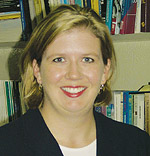Positive Thinking
Open gallery


by Todd Schwartz
Positive psychology. It sounds like a topic that would have its own shelf in the self-help section of the bookstore, but in reality it is a very serious science. And Suzanne Segerstrom ’90, assistant professor of psychology at the University of Kentucky, nationally respected researcher, and 2002 winner of the Templeton Prize—psychology’s largest monetary award—is a very serious scientist.
The 35-year-old Segerstrom is best known for rigorously testing the following question: Is optimism good or bad for the body’s immune system? The answer, according to the data so far, is yes.
The study that first brought wide attention to Segerstrom’s work examined whether optimism in the context of a stressor—the first year of law school—affected mood and immune changes in a sample of 90 students. At the beginning of the semester, there were no recorded differences in immune function between the law students who were optimistic about their first year and those who were pessimistic.
“We have seen that optimism positively affects the psychological response to stressful events, and this research reflects a first step toward expanding that observation to include physical health under stress.”So: optimism good, pessimism bad, right? Not so fast…
By midsemester, however, the optimists had more helper T cells (the “conductors” of the immune system, which direct and amplify immune responses and are believed to be more important in immunity against viral infection and some types of cancer) than pessimists had. They also showed higher “natural killer cell cytotoxicity,” which reflects the ability of T-cells to actually kill cancer cells in the laboratory.
Segerstrom, lead author of the study conducted with colleagues from the University of California at Los Angeles, said at the time, “We have seen that optimism positively affects the psychological response to stressful events, and this research reflects a first step toward expanding that observation to include physical health under stress.
So: optimism good, pessimism bad, right? Not so fast…
As Segerstrom continued her research, she began to find, as had others, circumstances in which optimism appeared to have a negative impact on the immune system. Several researchers had chalked this up to what they described as a “disappointment effect.”
“It seems,” says Segerstrom today, “that, in general, when stressors are less responsive to coping efforts, meaning they are less controllable or more persistent, optimism is associated with lower immune parameters. According to the disappointment-effect explanation, optimists hold a positive outlook, are proven wrong, and then feel disappointed—so their immune parameters fall. I have some problems with this interpretation.”
Which, given Segerstrom’s track record of research accomplishment, means that the proponents of the disappointment theory will soon be, well, disappointed.
Growing up in Portland, Segerstrom was a talented violinist, studying with a teacher named Raphael Spiro—which is how she found herself at Lewis & Clark, where Spiro was a faculty member. During her college years she discovered that, while music indeed hath charms to soothe a savage breast, psychology can reveal how said breast hath become savage in the first place. She graduated with a double major: music and psychology.
After some time off to prepare for grad school, Segerstrom moved south to UCLA, well known for its health psychology program. She trained under an acclaimed psychologist named Shelley Taylor, who also was one of America’s leading optimism researchers.
“I was immersed in the study of optimism from then on,” says Segerstrom, “not so much because of an interest in positive psychology—the term hadn’t even been coined at that point—but because of the quality of the scientists working in the field.”
“Positive psychology is concerned with understanding when and why people thrive, not in ignoring reality. I’m a good example of this point: Most of the work that I presented to the selection committee to win the Templeton prize last year focused on the negative effects of optimism on immune parameters.
It’s a field that has rapidly become one of the hottest areas of psychological research. Pioneered, at least in part, by Martin Seligman, the 61-year-old former president of the American Psychological Association and best-selling author, positive psychology is built on the idea that to be truly happy, people must draw upon what Seligman calls “signature strengths”—integrity, critical thinking, street smarts, love of beauty, kindness, perseverance—to reach their full potential.
One of the many institutions, organizations, and individuals who have brought both enthusiasm and millions of research dollars to positive psychology is John Templeton, a 90-year-old megamillionaire investor and philanthropist interested in questions of religion, humanity, and the soul. The Templeton Positive Psychology Prize is awarded annually to four researchers in the social sciences who are under 40 or who have spent less than 12 years in the field. Segerstrom received a total of $100,000—a $70,000 research grant and $30,000 for personal use.
The burgeoning field is not without its critics—led, until his death in November of last year, by the late Richard Lazarus, who was a professor emeritus at the University of California at Berkeley noted for his work on coping. Lazarus disapproved of the rise of positive psychology, which he belittled in scholarly journals as “happiology,” driven by “zealots and simplistic thinking.”
Such academic criticism is, for Segerstrom, positively unfounded.
“I do describe my area of research under the rubric of positive psychology,” she explains. “I think the objections to this umbrella term come from critics who think that positive psychologists would be intolerant to science that shows any drawbacks to qualities such as happiness and optimism. However, the people I know in the field, including previous winners of the Templeton prize, are good scientists first and so-called positive psychologists second.
“Positive psychology is concerned with understanding when and why people thrive, not in ignoring reality. I’m a good example of this point: Most of the work that I presented to the selection committee to win the Templeton prize last year focused on the negative effects of optimism on immune parameters.”
Which brings us back to those seemingly contradictory results. Like Segerstrom herself, who relaxes from the pressures of academia and research by playing her violin with Kentucky’s Lexington Symphony and Lexington Community Orchestra, understanding optimism and the immune system requires versatility.
It turns out that, like most things in life, the effects of optimism on the immune system are a product of the circumstances. According to Segerstrom, “disappointment theory” fails on several levels.
“Setbacks are inherent to almost every worthwhile human activity, and a number of studies show that optimists are in general both psychologically and physiologically healthier.”
“First,” she says, “when studies have looked at what happens to optimists when things go wrong, they do not show more disappointment or despair than pessimists, and sometimes they show less. Second, if generally positive thoughts and feelings (as in optimism) confer vulnerability, then generally negative thoughts and feelings (as in neuroticism) should be protective. I don’t know of any studies that show this, but I know lots of studies that show the opposite—that negative thoughts and feelings increase vulnerability to stress. Finally, if optimists fell into disappointment and despair every time they had some trouble reaching a goal, they would never achieve long-term positive outcomes. Setbacks are inherent to almost every worthwhile human activity, and a number of studies show that optimists are in general both psychologically and physiologically healthier.”
Segerstrom’s research is revealing that there are situations in which optimism is a stress reliever and situations in which optimism itself is a stressor. She cites the law student study as an example:
“Take the case in which some of the first-year law students remain in their hometowns to go to school, and others travel to new places. If we look at the people who go away from home, the optimists have higher immune parameters than the pessimists midway through the semester. Consider that they are devoting 100 percent of their time and energy to law school—they are dealing with just one thing.
“On the other hand, take the people who stay home. In addition to law school, they’re still in the middle of all their existing personal and family relationships, friendships, social groups—all the obligations they had before. Sometimes social networks are understanding of schooling that requires some 40 hours of study per week beyond class time. More often they are not, so there are enormous pressures if you try to maintain your relationships. In this group, the optimists had lower immune parameters, because, we believe, of what’s called the persistence model. Meaning that these optimists simply kept trying harder, kept believing they could have it all.”
You can almost hear the lazy grasshopper saying “I told you so” to the industrious ants. But that is not Segerstrom’s point.
“When optimists encounter a setback or slowed progress,” she emphasizes, “they are less likely than pessimists to just give up. They might keep trying or even redouble their efforts. The persistence model brings in physiology and says that when this happens, there could be some physiological costs. In the short term, when you run into trouble, it is easier on your body to give up than to keep trying. However, giving up is not a good answer if you ever want to achieve your goals, so it’s probably healthier in the long run to pay the short-term cost associated with staying engaged with your goals.”
Segerstrom—who over a short period of time has applied for tenure, gotten engaged, begun wedding plans, and bought and begun remodeling a house—could well use her own photo to illustrate the persistence model. She has a plethora of what she describes as “positive expectancies.” She can see the ultimate payoff—something pessimists, studies show, share a general inability to do.
Which leads to a predictable question: Is the optimism researcher herself an optimist? Segerstrom, who never introduces herself as a psychologist on airplanes, for fear of spending the next three hours listening to “very inappropriate disclosures,” graciously replies that she feels “more comfortable calling myself an optimist now that we’re defining that in terms of the persistence model. I don’t identify very well with the carefree, it’s-all-good notion of optimism, but I do certainly identify with the ‘long-term reward if you make it through’ idea!”
Segerstrom’s research is revealing that there are situations in which optimism is a stress reliever and situations in which optimism itself is a stressor.
Proof that, while the power of positive thinking may often be less jet engine and more ’72 Volkswagen climbing a long hill, it is wise to be optimistic, even in the face of setbacks. Sooner or later, your killer cells will thank you.
Todd Schwartz is a Portland writer who is pretty optimistic—but takes a multivitamin anyway.
More L&C Magazine Stories
Lewis & Clark Magazine is located in McAfee on the Undergraduate Campus.
MSC: 19
email magazine@lclark.edu
voice 503-768-7970
fax 503-768-7969
The L&C Magazine staff welcomes letters and emails from readers about topics covered in the magazine. Correspondence must include your name and location and may be edited.
Lewis & Clark Magazine
Lewis & Clark
615 S. Palatine Hill Road MSC 19
Portland OR 97219

